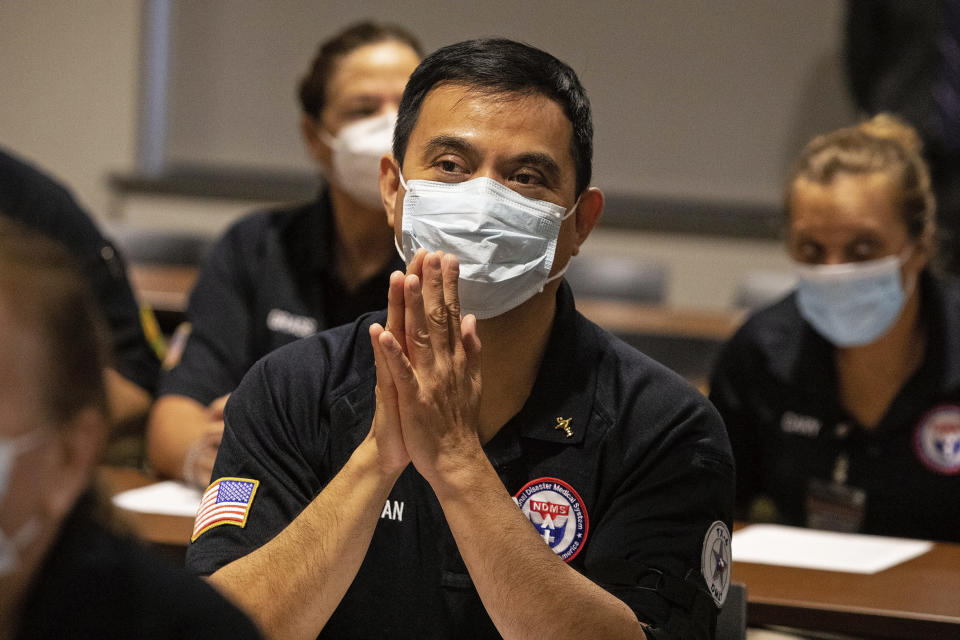Hospitals rationing care as flood of unvaccinated patients overwhelm facilities
Hospitals in hard-hit states facing an "onslaught" of the coronavirus, driven by the highly contagious delta variant, are struggling with the flood of unvaccinated patients and imploring the public to get vaccinated.
At Louisiana's largest stand-alone hospital, medical teams are overwhelmed by "the highest number of patients that we've ever had admitted to this medical center at one given time during the pandemic," said Dr. Catherine O'Neal, the chief medical officer at Our Lady of the Lake Regional Medical Center in Baton Rouge.
"It's occurred so much faster than any other surge," she said.
Just two weeks ago, the hospital had 36 Covid patients, and now it has 163, O'Neal said.
The state's coronavirus hospitalizations reached record levels Tuesday, with 2,112 people admitted. According to the Health Department, about 90 percent of them were not vaccinated. Louisiana also has one of the lowest vaccination rates in the county and the highest per-capita Covid case growth, according to Gov. John Bel Edwards.
At Our Lady of the Lake Regional Medical Center, the patients are younger overall than during previous surges and are unvaccinated, O'Neal said, with rare breakthrough cases in vaccinated patients limited to more elderly people or those with compromised immune systems. The alarming increase has meant the hospital must ration its care.
"We're rationing care to be able to see the sickest people first, and that means that we are not providing adequate care to many people right now so that we can meet the needs of the sickest first," she said. "That safety net of care that every community depends on for every type of illness is starting to break down, and that's very concerning."
A federal team of health care workers arrived over the weekend to provide much-needed support to overcome staffing shortages as the cases continue to overwhelm the system, O'Neal said.

"Any help that the state and the federal government could give us to help hold that safety net up is very good right now," she said.
The Centers for Disease Control and Prevention warned last week that the delta variant is "highly contagious" and "likely to be more severe" and that although they are rare, "breakthrough infections may be as transmissible as unvaccinated cases."
O'Neal said her message to members of the public still hesitant about vaccines or who are still considering getting vaccinated is: "Everybody's got a part to play in a war."
"We have an onslaught of a virus that has no end. We're asking everybody to play their part," she said. "The parts that they play may not be perfect, but we all have to contribute something to the end of this pandemic. If you get vaccinated, you will be contributing something."
In Arizona, the chief clinical officer of Banner Health, the state's largest hospital system, said Tuesday afternoon that Covid hospitalizations have increased by 95 percent and that ventilator use has increased by 300 percent since July 1. Hospitalizations in the state have more than doubled since July.
Hospitalizations, admissions to the intensive care unit and ventilator use have been in the 20-60 age group, while previous surges mainly hit patients over 60, Dr. Marjorie Bessel of Banner Health said at a virtual news conference. Pediatric patients were 5 percent of current Covid hospital admissions, she said.
"Please get vaccinated as soon as possible. The vaccines that have been approved by the FDA through emergency use authorization are safe and effective," she said. "They will greatly reduce your chances of getting seriously ill and dying."
Bessel said that while the current surge has not yet matched those of July 2020 and January, the graph depictions of the cases were concerningly similar.
"The slope of what we're starting to experience looks very, very similar to the exponential growth that we experienced during those two very large surges," she said.
In Austin, Texas, health officials said in a statement Friday that the region's low intensive care unit bed capacity was similar to what it was at the beginning of the pandemic, reaching as low as "16 ICU beds for as many as 11 counties with over 2.3 million residents."
In a joint statement, the hospitals Ascension Seton, Baylor Scott & White and St. David's Healthcare said, "The latest Covid-19 spike is putting extraordinary pressure on our hospitals, emergency departments and healthcare professionals, and it has further challenged hospital staffing due to a longstanding nursing shortage."
Austin health officials urged the public to get vaccinated, wear masks and stay home when sick.
"We are running out of time, and our community must act now," Dr. Desmar Walkes, the Austin-Travis County medical director and health authority, said in the statement. "Our ICU capacity is reaching a critical point where the level of risk to the entire community has significantly increased, and not just to those who are needing treatment for Covid. If we fail to come together as a community now, we jeopardize the lives of loved ones who might need critical care."
